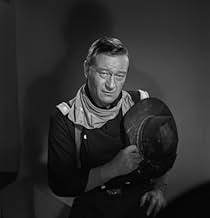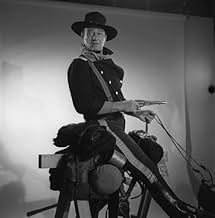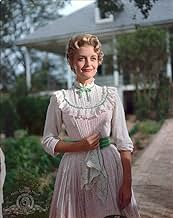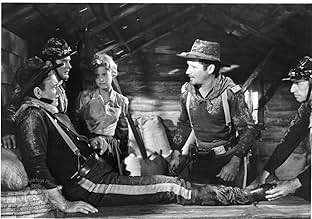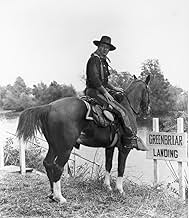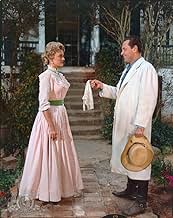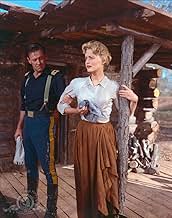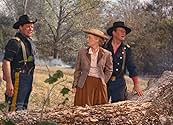En 1863, un equipo de la Unión es enviado detrás de las líneas confederadas en Mississippi para destruir las vías férreas enemigas, pero una belleza sureña cautiva y el médico de la unidad c... Leer todoEn 1863, un equipo de la Unión es enviado detrás de las líneas confederadas en Mississippi para destruir las vías férreas enemigas, pero una belleza sureña cautiva y el médico de la unidad causan fricciones dentro de las filas.En 1863, un equipo de la Unión es enviado detrás de las líneas confederadas en Mississippi para destruir las vías férreas enemigas, pero una belleza sureña cautiva y el médico de la unidad causan fricciones dentro de las filas.
- Dirección
- Guión
- Reparto principal
- Premios
- 1 nominación en total
Reseñas destacadas
In PRISONER OF SHARK ISLAND he dealt with the story of Dr.Samuel Mudd, who was sentenced to life imprisonment for involvement in Lincoln's Assassination. In HOW THE WEST WAS WON, Ford did the segment dealing with the battle of "SHILOH", with Harry Morgan as General Grant and John Wayne as General Sherman. This film was the nearest that Ford ever got to his dream film. THE HORSE SOLDIERS was the only film that was devoted to a full study of the effect of the war in the South, on both Union and Rebel soldiers. While not, perhaps, the best that Ford could have achieved - he was in the twilight of his master career - it is a fine film none-the-less.
The story is based on an incident in 1863 known as Grierson's Raid. Cavalry leader Benjamin Grierson was sent by Grant into Alabama and Mississippi on a raid to attack a railway junction, supposedly to destroy it for strategic reasons. While it was important to knock the railway junction out of effective work, the real purpose was to tie up Confederate forces in these backwaters. Since December 1862 Grant was struggling to capture the city of Vicksburg, Mississippi, the last major Confederate stronghold on the Mississippi River. But try as he did Grant kept losing to the Confederates under Joseph Johnston and John C. Pemberton (the commander in Vicksburg). But Grant had noticed how Confederate cavalry men like Earl Van Dorn and Nathan Bedford Forrest had forced him to use men to protect his supply lines, and took valuable time away from him trying to fight off or track them down. He decided that Grierson, a first rate Cavalry leader, could do the same thing to Johnston. A very intelligent Confederate Commander, Johnston was nervous at unexpected difficulties. Grant reasoned that Grierson's men would panic Johnston, and cause him to waste time chasing him down.
As it turned out Grierson's Raid worked. The pinning down of large numbers of Rebel troops in Alabama and Missisippi was wonderful for Grant's Vicksburg campaign. It was the beginning of the successful conclusion of the campaign, as Johnston's attention was now split between trying to help support Pemberton and trying to reassure frightened southern populations in the hinterlands. Grierson got most of his men back to Northern lines. Vicksburg was able to hold out until July 4, 1863. It's fall (the day after Lee's defeat at Gettysburg) really marked the beginning of the end of the Civil War.
This incident is the basis for THE HORSE SOLDIERS. Ford concentrates on what the experience of the war must have been like in the Southern countryside. Certain things are taken from other incidents and battlefields. When a military school's cadets are brought into the field to try to catch or slow down John Wayne's men, Ford is really picking up on an incident in the war in Virginia, when the young cadets at the Virginia Military Institute came out to fight the Union troops under Sheridan in 1864. One can forgive the transition of the incident.
It has been pointed out that one of the characters, Colonel Secord (Willis Bouchey) is a splendid type - the political officer. Men like Secord (usually in the position of General) bedeviled both sides, because of their usually normal level of mediocrity or idiocy. A few rose to the job well - the best of the Northern political generals was "Black Jack" Logan, who would be a valuable associate of Sherman in the battles around Atlanta. But for every positive General Logan, there were thieves like Benjamin "Spoons" Butler, who feathered his nest as military governor of New Orleans (he supposedly stole even the silver spoons of the citizenry). Actually Secord is normally intelligent, and follows Wayne's strategy. But he is constantly looking ahead at post-war elections. Towards the end he even wonders if the White House beckons.
Another lovely moment shows the fraying of the Southern cause. Wayne and his men come across two Rebel deserters (Strother Martin and Denver Pyle) who have tied up the local sheriff (Russell Simpson). Wayne thanks Martin and Pyle for their unofficial assistance to the Northern cause,telling them which way they plan to go. While Martin chatters away (mentioning the strength of Rebel forces in the area), Wayne carefully knocks out Pyle and then Martin, and then unties Simpson and assists in tying up the two deserters. William Holden is watching this, and later asks why he helped Simpson. Wayne explains that he decided to feed the deserters false information about his own movements, as they would probably give the information to the Confederates later on anyway.
All the performances are fine, with Wayne in particular as a man who hates doctors and medicine for a valid personal reason. Holden is in a subordinate role but he gets some nice moments. So does Constance Towers, in a rare leading part, as a passionate Confederate supporter who gradually gets to like Wayne. Carleton Young, as a former friend of Wayne, has a moment trying to rally Confederate forces at the railway depot.
It is a good Ford film, and makes one wish that Ford had made his Ulysses Grant biography.
Ford's battle scenes are as usual patriotically free of blood and require no reflection but the imagery is great (you want to join the cavalry) and the detail outstanding. We hear the clanking of canteens and cookpots, an argument over the placement of latrines and see the only filmic presentation of the making of Sherman Neckties (warped rails). The Ford family is well represented though we miss Harry Carey Jr (and Paul Fixx must have been tied up with the Rifleman).
If we had to have a love interest, Maureen Ohara could have at least tied this to "Rio Grande" and furthered the Ford library.
Normally wonderful Bill Holden has only brief bright moments and is mostly going through the motions and hung-over here. Neither Wayne nor Ford were slouches when it came to curling whiskey but by his own admission Holden aggravated all and threatened production with reckless, drunken extracurriculae, breaking an arm falling from a bridge.
This film was an inspiration in grade school and a guilty pleasure since.
Duke is fine. It's not one of his more memorable roles, though that's more the fault of the script than his performance. William Holden plays an army surgeon Duke is forced to take along with him. In all honesty, Holden's character seems completely tacked-on to the plot. He could've been removed entirely without upsetting the film much. It might have even improved it. Constance Towers is fun as a Southern belle the soldiers have to take with them on their march. At first she seems flighty but soon shows there's more to her. She also has one of the most provocative scenes from any Ford film, where she bends down in front of John Wayne with her cleavage exposed, offering him some chicken and saying "Would you like a leg or a breast?" She's probably the only standout in the film. It's not one of Ford's best. It's watchable and interesting enough, but also overlong and familiar in tone to other cavalry movies I've seen, despite the change in locale. Obviously Wayne and Ford buffs will want to check it out.
It's the sort of Ford film that must have been hard on the actors, riding through swamps on horseback and engaging in fierce battles when pursued by Rebel forces. William Holden has some wonderful moments as a doctor who is constantly bickering with John Wayne. Their exchanges provide plenty of tension and humor--and both actors are at their best under Ford's direction.
A good Civil War western combining magnificent photography, good performances and some rousing battle scenes. The horrors of war are not ignored and there are some sentimental moments that never strike a false note.
¿Sabías que...?
- CuriosidadesThe film marked the beginning of mega-deals for Hollywood stars. John Wayne and William Holden received $775,000 each, plus 20% of the overall profits, an unheard-of sum for that time. The final contract involved six companies and numbered twice the pages of the movie's script. The film, however, was a financial failure, with no profits to be shared in the end.
- PifiasIn the shot right after Hank Worden throws the torch onto the cotton bales, look at the upper left of the screen. You will see an airplane flying from right to left.
- Citas
Miss Hannah Hunter: [bending over with a plate of chicken, revealing ample cleavage] Do you prefer the leg... or the breast?
Col. John Marlowe: I've had quite enough of both, thank you.
- ConexionesFeatured in Directed by John Ford (1971)
- Banda sonoraI Left My Love
by Stan Jones
Selecciones populares
Everything New on Prime Video in July
Everything New on Prime Video in July
- How long is The Horse Soldiers?Con tecnología de Alexa
Detalles
- Fecha de lanzamiento
- País de origen
- Idioma
- Títulos en diferentes países
- Missió d'audaços
- Localizaciones del rodaje
- Empresas productoras
- Ver más compañías en los créditos en IMDbPro
Taquilla
- Recaudación en Estados Unidos y Canadá
- 1.753.526 US$
- Duración2 horas
Contribuir a esta página



